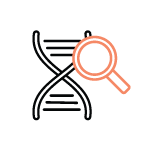DiaCarta is a leading precision diagnostic company specializing in providing comprehensive one-stop-shop for cancer patient management solutions.
1
Early Detection/Screening
2
Diagnosis
3
Therapy Selection
4
Therapy Monitoring
Our offerings
Our proprietary XNA technology and isobDNA™ technology allow for sensitive, accurate, and cost-effective detection of genetic alterations using different genomic platforms, positioning us as a leader in the precision diagnostic industry.
Our suite of diagnostic products and services, including RadTox™, ColoScape™, and Oncuria®, along with our range of infectious disease tests, such as HPV tests and MonkeyPox tests, deliver superior clinical performance and economic value to healthcare providers and patients worldwide.
Global Expansion

Our team of world-class scientists, clinicians, and industry experts is dedicated to advancing precision medicine through continued investment in research and development, strategic partnerships, and global expansion.
ISO 13485 certified GMP manufacturing facility
Based in California, USA, with global subsidiaries in Europe and Asia
Innovative R&D lab
CAP-accredited CLIA lab
Affordable Excellence with Unmatched Sensitivity and Specificity
XNA Technology
Current genomics technology has improved a lot. We can now detect genetic/somatic mutations in tissue samples (biopsy) and even in body fluids (liquid biopsy). Still, it is tough to find rare genetic changes, especially those in early-stage cancer or residual cancer cells (MRD, or Molecular Residual Disease, monitoring).
XNA technology solves this problem by boosting sensitivity and specificity in traditional platforms like Sanger sequencing, qPCR, ddPCR, and NGS, without changing the existing protocol.
High-throughput and sensitive mutation detection and quantification capability without DNA sequencing
isobDNA™ Technology
Tools like qPCR and ddPCR are often used to quantify gene copy number and gene expression. But, to get accurate results, we first need to extract and purify the DNA or RNA from samples. The problem is, during the extraction, we will lose some DNA or RNA. This becomes a big concern when we only have a small amount of samples to start with.
isobDNA™ technology solves the problem because it does require the sample extraction process. Instead of amplifying the targets like PCR technology, isobDNA technology amplifies the signals. It’s just as sensitive as PCR but more accurate.
DiaCarta Helps Communities Scale Up Their MPOX Testing Efforts with Its Simple, Reliable, and FDA-EUA-Approved MPOX Testing Kits
DiaCarta, Inc., an experienced in-vitro diagnostics (IVD) company that provided COVID-19 testing kits during the global pandemic, has expanded its focus to mpox detection and the detection of other infectious diseases.
DiaCarta and Capstone Health Alliance Collaborate to Bring Revolutionary Diagnostic Tests to Enhance Patient Care
DiaCarta, Inc., a pioneer in developing innovative molecular technologies to transform patient care by providing effective precision diagnostics using liquid biopsy in cancer and infectious diseases has established a strategic collaboration with Capstone Health Alliance, one of the largest regional group purchasing organizations (GPO) in the US healthcare sector. This new collaboration brings together powerful technologies to enhance patient care.
NGS test for colorectal cancer to guide targeted therapy
Colorectal cancer (CRC) can develop from germline genetic mutations inherited from family or somatic mutations developed later in life. Our Optiseq™ colorectal cancer NGS for mutation detection panel covers genes associated with both hereditary and somatic mutations...
Detection of ROS1, RET, and ALK fusions in non-small cell lung cancer
ROS1 (c-ros oncogene 1), RET (rearranged during transfection), and ALK (anaplastic lymphoma kinase) are receptors of tyrosine kinases that play important roles in cell growth and differentiation. ROS1, RET or ALK fusion is formed by chromosomal rearrangements that...






